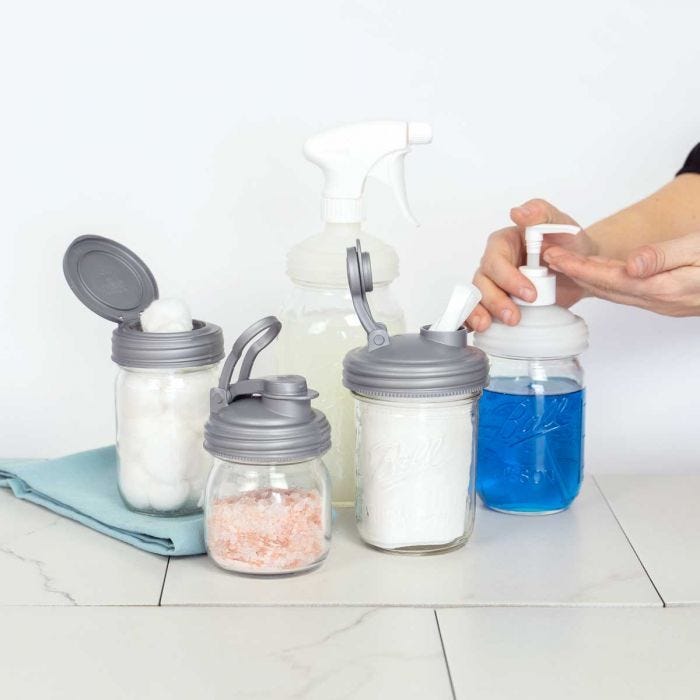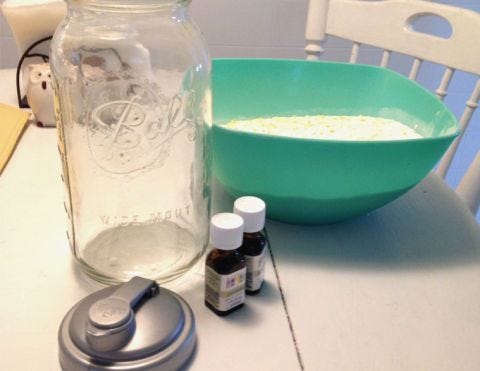Protecting Yourself from the Coronavirus, the Flu, and the Common Cold
With today’s 24-hour media cycle, it’s vital to remember that the news is spreading a lot faster than any germs and viruses are. However, it’s always beneficial to review a few preventative best-practices.
If you’ve shopped on MasonJars.com previously, you may know that a key part of our mission is to “foster healthier communities.” As an initiative to make good on that promise, we thought it would be wise to review precautions you can take to protect yourself from the coronavirus, the flu, and the common cold.
The Coronavirus, Flu, and the Common Cold
The outbreak of the respiratory disease “coronavirus,” or COVID-19, is caused by a virus called SARS-CoV-2. Medical professionals first detected the coronavirus in China on December 1, 2019. Over the past three months, the virus has spread to roughly 90 different international locations, including Italy, Canada, and the United States. Furthermore, the number of people infected has increased drastically from single digits to well over 150,000 people.
The severity of coronavirus symptoms varies widely from patient to patient. While some patients report no symptoms at all, others have severe cases that require hospitalization. As of March 16, 2020, about 6,500 people have died from the disease.
While the coronavirus is getting the lion’s share of media attention, it’s important to remember that there have been at least 34 million documented cases of the flu this 2019-2020 season. Over 350,000 people have been hospitalized, and 20,000 people have died. Nationally, the most common flu is currently influenza A (H1N1).
Additionally, the average adult has two to three colds per year. The common cold is caused by a multitude of different viruses, including:
-
Adenovirus
-
Human coronaviruses
-
Human metapneumovirus
-
Human parainfluenza viruses
-
Respiratory syncytial virus
While the 2019-2020 season has brought about some serious health risks, know that there are some key methods of prevention that can dramatically lower your chances of getting sick. To help you stay healthy, we’ve outlined those best practices below and highlighted some products you can use to alleviate your health-related anxieties.
1. Keep Your Hands Clean
Handwashing can literally save lives. The University of Michigan found that proper handwashing can contribute to a 75 percent reduction in the spread of flu-like symptoms. If you have children, be sure to educate them on how to wash their hands properly and talk to them about why it’s so important to do it correctly. Remember to wash your hands:
-
After blowing your nose, coughing, or sneezing
-
After changing diapers
-
After handling pet food or treats
-
After touching garbage
-
After using the restroom
-
Before and after caring for a cut or wound
-
Before and after caring for a sick person
-
Before eating

To maximize soap’s germ-dispelling abilities, follow these handwashing guidelines from the CDC:
-
Wet your hands with clean, running water (warm or cold), turn off the tap, and apply soap.
-
Lather your hands by rubbing them together with the soap. Lather the backs of your hands, between your fingers, and under your nails.
-
Scrub your hands for at least 20 seconds. Need a timer? Hum the “Happy Birthday” song from beginning to end twice.
-
Rinse your hands well under clean, running water.
-
Dry your hands using a clean towel or air dry them.
Make sure there’s a filled soap dispenser at each sink in your home. If you don’t want to buy more soap containers, pick up a reCAP® pump lid to turn your old Mason jars into soap dispensers.
While the ideal option for cleaning dirty hands is soap and water, hand sanitizer is a helpful alternative when hand washing isn’t an option. If you do go the sanitizer route, make sure you’re applying it generously. A study by the American Council of Science and Health found that that ideal amount of hand sanitizer is about three milliliters (a little more than ½ a teaspoon), or enough to spread across the entire surface of your hands.
Keep Mason jars around your house, fill them with hand sanitizer, and equip them with a reCAP® pump lid for easy access and application.
2. Clean and Disinfect the Right Way
At MasonJars.com, we often recommend creating chemical-free cleaners for your home. However, when it comes to emergency situations, sometimes you need to bust out the big guns.
Start by cleaning infected surfaces with soap and water. To fully sanitize surfaces, the CDC recommends a solution of 5-25 tablespoons of bleach per gallon of water. The Council for Biocide Chemistries also created a comprehensive list of products that may be capable of warding off the COVID-19, most of which include a bleach additive.

The Water Quality and Health Council also recommends mixing a new solution every time you clean, as bleach is only potent for approximately 24 hours.
Use a Mason jar to mix the right amount of solution needed for each cleaning session. Be sure to label your jar and sprayer lid for bleach solution only! To be safe and avoid chemical contamination, never use your bleach-solution jar or sprayer for anything food-related, even after you’re washed them out. Mixing bleach with other cleaning products, even vinegar, is strongly advised against. The American Cleaning Institute also suggests wearing rubber gloves and having adequate ventilation when using bleach.
3. Equip Yourself with Food and Supplies
The last place you want to be when a case of the coronavirus emerges in your community is a crowded grocery store. Experts recommend having a supply of food and medicines to last a few weeks so you can avoid the petri dish of public spaces.
*However, please do not overbuy. Buying an overabundance of food and supplies can leave others without essentials.
Supplies to have on hand include:
*Indicates 20+ years shelf life if stored correctly in a Mason jar*
|

Okay, perhaps the chocolate and coffee aren’t vital to physical health. However, many professionals believe comfort foods like these can plan a big part in your mental health and morale.
Build Your Supply Kit
Get your supplies together now rather than later. Check out the reCAP’s five-piece starter, which can help you clean house before you hunker down.
4. Know How to Make The Essentials
As hand sanitizer, soap, and “sports” drinks become scarce, it’s important to know how to make DIY versions.
Hand Sanitizer Recipe
In a jar or similar container, mix:
-
3/4 cups 91% or above isopropyl alcohol
-
1/2 cups aloe vera gel
-
3 drops lavender essential oil (optional)
-
3 drops eucalyptus essential oil (optional)
Antibacterial Hand Soap
In a jar or similar container, mix:
-
12 oz distilled (or boiled) water
-
3-4 tbsp castile soap,
-
1/2 tsp olive or almond oil
-
Six drops essential oils (optional)
Hydrating “Sports” Drink
In a large jar or similar container:
-
1 quart liquid such as coconut water, plain water, or tea
-
1/8 tsp Himalayan pink salt
-
3/4 cup of natural fruit juice
-
1 1/2 tbsp of sweeteners such as honey
*These drinks only last about three days. If you want to prepare them in advance, throw them in the freezer until you are ready to use them.
5. Avoid Crowds
It’s impossible to isolate the sick population from the healthy completely. However, there are other ways to slow the outbreak.

The most effective way to avoid contracting the coronavirus and other sickness is by practicing what health experts refer to as “social distancing.” Practicing social distancing includes, but is not limited to:
-
Avoiding large crowds (250+)
-
Working remotely whenever possible
-
Staying at home as much as possible
-
Keeping your distance from sick people
It’s important to note that, while we should keep our distance from those who are sick and avoid public places, it’s vital to stay in communication with our friends, family, and neighbors. Checking in with elderly folks is especially critical as the coronavirus can be deadly for this population. If you don’t hear from a person you’re in regular contact with, please consider calling the non-emergency line at your police department for a welfare check.
Staying Healthy and Safe
As the coronavirus continues to spread, keep these three best-practices in mind: 1. Wash your hands 2. Disinfect your home, and 3. Stock up on supplies. By following these simple rules, you’ll have a much higher chance of staying healthy during this turbulent season.


